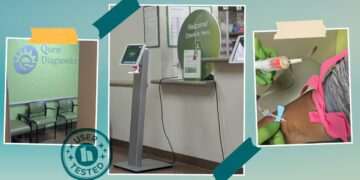Nobody likes to think about the possibility of a medical crisis. Emergency situations can happen. When they happen, it is vital that you’re prepared and know exactly what to do.
How To Be Prepared
Your top priority should be to prevent a medical crisis from ever happening. It includes:
- maintaining a healthy lifestyle
- Vaccinations up to date
- using safety gear
- wearing a seatbelt
- Never drink and drive
Even if you follow all the rules, something can still happen. You need to be ready to react quickly and accurately in an emergency.
- Keep up-to date and accurate medical information (such as family history information, allergies, health histories, current medications, etc.) readily available. )
- Stock up on first aid kits and keep them in your car and home.
- You should also store the emergency contact numbers of family members or close friends in your phone under ICE (In Case of Emergency). You should also store the emergency numbers of your family members or friends in your phone.
- Find the nearest hospital or medical facility.
- CPR and First Aid will help you react quickly and accurately in an emergency.
- Recognize the signs of an emergency and respond quickly.
Warning signs of a medical emergency
This list of emergency warning symptoms and signs is provided by the American College of Emergency Physicians
- Shortness of breath, difficulty breathing or choking
- Pain or pressure in the chest or upper abdomen lasting longer than 2 minutes
- Loss of consciousness, dizziness or fainting, and syncope
- Vision changes
- A difficulty in communicating or speaking.
- Changes in mental state, such as confusion, abnormal behavior, difficulty waking up, or other symptoms
- Any sudden or severe pains
- Any injury that threatens life or limb
- Large or deep wounds, or bleeding that is uncontrolled
- Severe or persistent vomiting or diarrhea
- Blood in the Cough or Vomit
- Feelings of suicidal or violent feelings
- Unusual abdominal pain
- Ingestion a poisonous substance
Additional signs and symptoms of a medical emergency may be present in children and other individuals who are vulnerable, including:
- Changes in behavior that are significant and unusual (confusion, reduced responsiveness, excessive sleeping, abnormal irritability or withdrawal, seizures)
- Headache or vomiting after a head trauma
- Unsteady standing or walking
- Abnormal breathing
- Skin or lips with blue, purple or gray color
- Eating difficulties
- Worsening pain
- A fever with a sudden change in behavior, a severe headache, with a mental shift, stiff neck or back, or rashes
What to do in an emergency
Call for an ambulance Instead of driving someone to hospital, if any of the following questions are “yes”, call an ambulance
- Does the condition of the patient appear to be life-threatening or not?
- Could it be life-threatening if you go to the hospital?
- Can moving the person make their condition worse?
- Is the situation one that requires medical equipment or skills?
- Does the delay in traffic or distance make the person’s condition worse?
When you call 911:
- Speak clearly and calmly
- Provide the location of the person who is in need (for example 1234 Washington Street in the upstairs bedroom), their name, address and telephone number.
- As best you can, describe the situation and conditions
- Do NOT hang up before or the dispatcher has given you permission to do so. (They may need more information.)
- Teach children to call 911 in the event that you cannot
While you wait to receive help:
- Stay calm.
- Follow instructions from the dispatcher.
- Be with someone in need. Listen to them and comfort and support them.
Never move the person, unless you are forced to do so by immediate danger.













